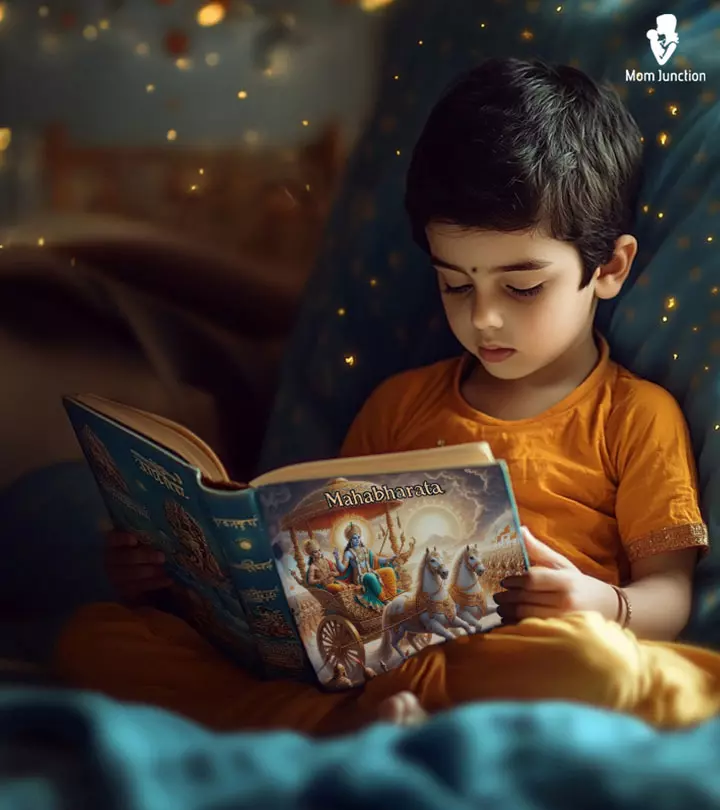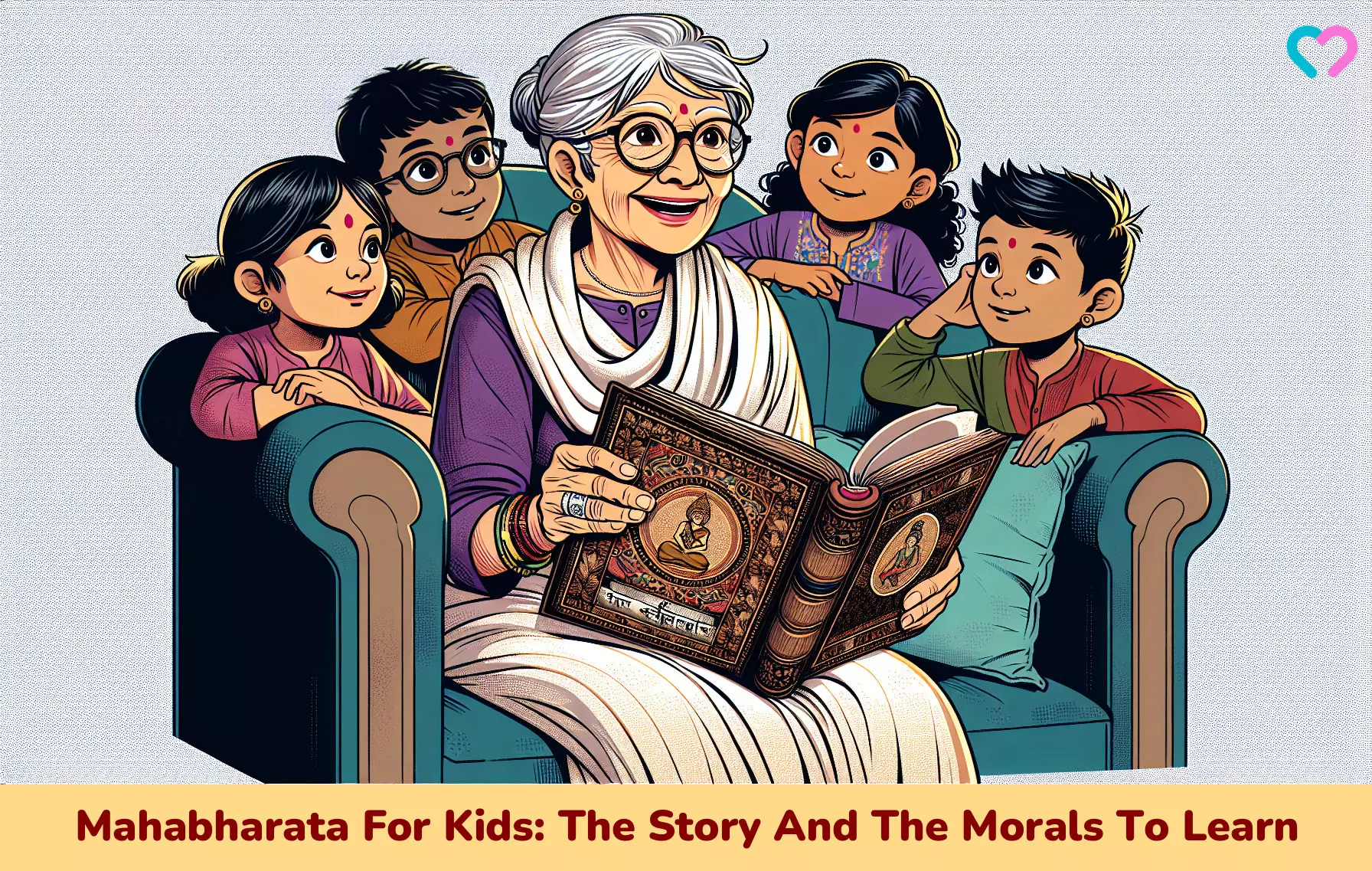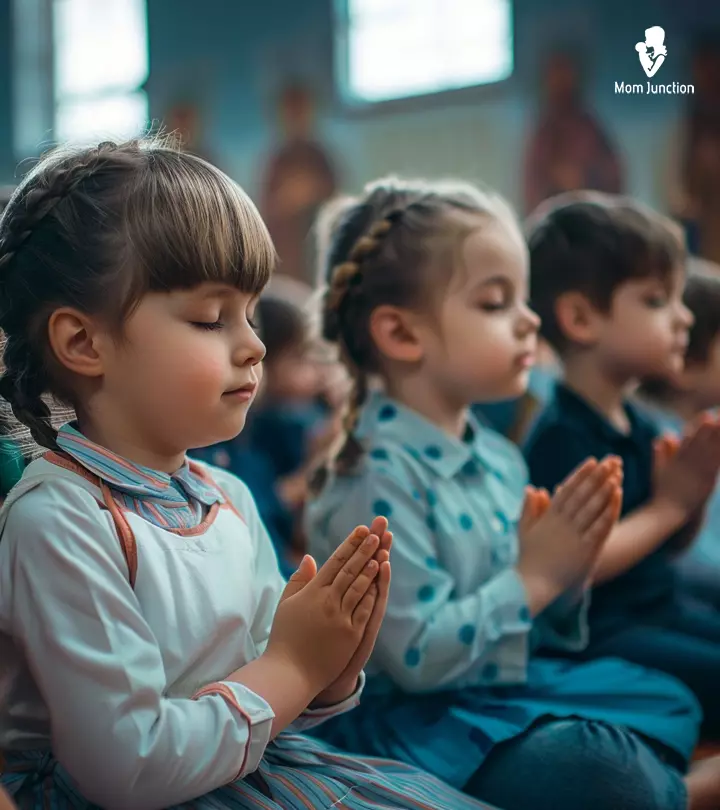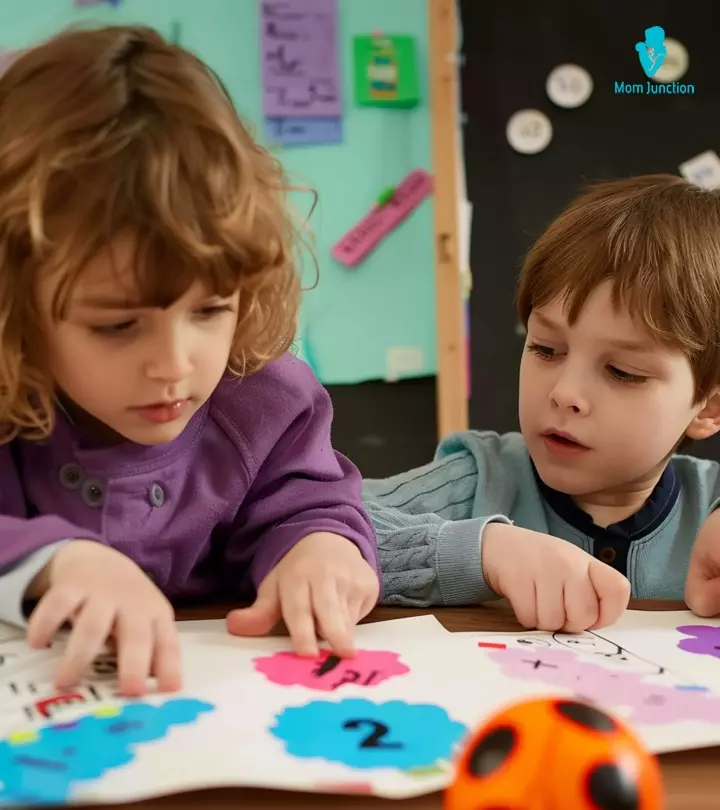
Image: Midjourney/ MomJunction Design Team
The Mahabharata is a major Sanskrit epic of India, also considered the world’s longest. A concoction of philosophy and Hindu mythology, Mahabharata was narrated by sage Veda Vyas and written by Lord Ganesha. Mahabharata for kids has always been a great source of stories in children’s literature that teaches them the importance of family, values, and friends. In this post, we bring you Mahabharata stories and the morals to learn.
Key Pointers
- Mahabharata is the world’s longest epic, recited by sage Veda Vyas and written by Lord Ganesha.
- It has several short stories that guide a person to live an ethical and moral life.
- The story of Mahabharata revolves around five Pandavas brothers and their hundred cousins, the Kauravas.
- The epic teaches several important life lessons about greed, jealousy, envy, and bad company.
- It also highlights how a wrong step and half knowledge can be devastating.
What is in Mahabharata?
Mahabharata is one of the most valuable works that has been enlightening people since ages. It is built with several significant facts that teach a person to learn and keep up with human and ethical and moral values required for a prosperous living. Man is a social animal and should abide by the rules of the society. This fact is clearly established in the short stories of Mahabharata.
Mahabharata Story In Short
Mahabharata is a source of infinite knowledge and way of living. It revolves around the relentless hatred and vengeance among cousins, which finally leads to the greatest battle of the Kurukshetra. Here is the story of Mahabharata in short for kids.
Shantanu, the king of Hastinapura, is married to the beautiful river goddess Ganga, who gives birth to Devavrata (Bhishma), a wise and a strong prince. Eventually, Shantanu marries Satyavati, mother of Vyasa, promising her that her future son will be the king. Shantanu has two sons with Satyavati, but both are short-lived.
Satyavati asks her elder son Vyasa to father children with Ambika and Ambalika, the widows of her dead son Vichitravirya. Ambika gives birth to a blind child, named Dritharashtra and her sister Ambalika to a pale skinned child Pandu.
Dritharashtra, because of his blindness, becomes ineligible to take the throne, and his step brother Pandu becomes the king. Pandu has a curse on him that he would die when he has a sexual relationship.
Pandu’s first wife Kunti holds a particular boon to bear children and gives birth to the virtuous Yudhishthira, the enormously strong Bhima, and the great warrior Arjuna. Before getting married to Pandu, Kunti tries to test her boon, and gives birth to Karna. She abandons him in the fear of ignominy.
Madri, Pandu’s second wife, borrows Kunti’s secret and gives birth to the twins Nakula and Sahadev.
These five brothers are the Pandavas and the heroes of the story. They share a common wife Draupadi.
King Pandu dies after mating with his second wife, and his brother Dritharashtra becomes the king.
Dritharashtra and his wife Gandhari have a hundred children, the Kauravas. Duryodhana is the eldest of them.
Both the Pandavas and Kauravas grow up with dislike towards each other. The Pandavas, with their physical strength, positive attitude and good deeds, became popular among the subjects of the country. On the other hand, the Kauravas are seen to be jealous and wicked.
The eldest Kaurava, Duryodhana, teams up with his younger brother Dhusyasana, close friend (and the Pandavas’ step brother) Karna and maternal uncle Shakuni to shun the Pandavas out of their kingdom.
They challenge Pandavas to a game of dice, and defeat them with treachery. The Pandavas lose everything, including their wife Draupadi, to the Kauravas.
The Kauravas impose a 12-year exile followed by a year of anonymity on the Pandavas. During this period, the Kauravas make several attempts to kill their cousins but Pandavas escape with the support of their maternal uncle Lord Sri Krishna.
After completing their 13-year exile, the Pandavas seek back their part of the empire. But their cousins refuse to give it, leading to the great war of Kurukshetra.
The war lasted for about 18 days in the fields of the Kuru clan and so the name Kurukshetra. The holy Hindu scripture, Bhagavad Gita, told by Krishna to Arjuna, has evolved during this episode.
The Pandavas win the war with the support of Krishna but the victory comes at the cost of the lives of their relatives and loved ones.
Lessons For Kids From Mahabharata
Mahabharata can be regarded as the most valuable treasure of moral values for today’s generation. It has got everything that is required for a better living. It teaches the basic ethics a human should have to lead a proper life. Its teachings can be attractive to kids as they can be told as stories.
Here are some interesting and relevant life lessons from Mahabharata that every child should know.
- Jealousy is the primary cause of misery. This can be understood from Ghandhari, the mother of Kauravas. Therefore, advise your kids to share and spread love without any negative feelings.
- Envy is the main reason behind budding rivalry, and it can cause maximum damage to an individual. This can be understood from the relationship of Kauravas and Pandavas, which finally leads to the destruction of the Kuru clan. Advise your kids against developing hard feelings or prejudice against anyone.
- A bad company can ruin you from the roots. This can be understood from the characterisation of the great Karna. Though he is a great warrior, incredibly talented and a humble human, his friendship with Duryodhana led to his downfall. Therefore, teach your children to choose their company correctly and carefully.
- Do have faith in the Lord Almighty, irrespective of your abilities. This can be clearly understood from the way the mighty Arjuna believes in Lord Krishna.
 Point to consider
Point to consider- A wrong step taken during any stage of life can show its effects for a lifetime. This can be understood from the life of Kunti, who hides the fact about the birth of her eldest son Karna.
- Therefore, teach your child to lead a fair life and explain to them the need of speaking the truth irrespective of the consequences.
- Never ill-treat a woman, because it may cause devastation and a total downfall. This is evident from the life of Duryodhana and his brother Dhusyasana. Parents, teach your little munchkins to respect women.
Vasantha Vivek, a working mother and a blogger shares how her son emulates the lessons from this epic. She says, ”The epic saga of Mahabharata has attracted him for many fascinating reasons. He loves the characters, morals, adventures, fiction, knowledge, and wisdom shared by the innumerable stories of Mahabharata. Last week, in one such discussion, he shared about the life lessons he learned from Mahabharata in his 13 years. As a mom, I feel really happy about his learning.
Lord Krishna taught that one should perform his duties as a son, husband, father, and student without fail. We used to give my son some work right from the time he was able. He never refused. He enjoys helping in the kitchen and also loves to assist his father in shopping, and traveling. In fact, he is our guru (teacher), guiding us with modern gadgets. Krishna’s stories guide one to support good causes. My son usually takes two or three sheets of paper extra for his exams. One day, I asked him why you always take extra sheets to school. And I was really moved to hear his reply. He said that he gave those extra sheets to a poor boy in his class. He is always a peacemaker! (i).”
 Quick tip
Quick tip- Never get addicted to a dangerous practice, because it can make you lose your worth and downgrade your growth. This is pretty clear from the story of Yudhishthira, who lost everything for his craving towards the game of dice. Teach your children to have control over themselves and make them know their limits.
- Yudhishthira’s actions teach us righteousness and truth, while Duryodhana exemplifies the dangers of ambition and jealousy. Similarly, Arjuna depicts the importance of duty while struggling with moral dilemmas, while Karna symbolizes the outcomes of blind loyalty. Thus, the actions of the key characters can serve as guidelines for living a balanced life.
Frequently Asked Questions
1. How can children understand the complex themes and moral dilemmas presented in the Mahabharata?
It can be difficult for children to understand the complex themes of the Mahabharata, but presenting the various events in short stories, using age-appropriate language and presentation, and relating them to real-life situations in a child’s life can help. Mahabharata movies, storybooks with pictures, and some play activities associated with Mahabharata can also be a useful tool to help children learn about essential attributes of karma and dharma.
2. Are there any common misconceptions or misunderstandings about the Mahabharata that children should know?
Many think that the epic of Mahabharata is a simple story of good versus evil, but it includes multiple ideologies, moral decisions, and heroic yet flawed characters. Thus, the story teaches children about several contemporary concepts and moral values, making it an ideal source of ethical and moral education for children.
3. Why is Mahabharata relevant today?
The Mahabharata remains relevant today as it addresses timeless themes such as justice, morality, and the complexities of human relationships. Exploring and understanding these themes can help children better understand their own lives and the moral dilemmas they face. The lessons in the epic can act as a guide to lead children in the right direction.
4. What fun activities or projects can children do related to the Mahabharata?
Doing a play based on Mahabharata, creating Mahabharata-inspired crafts, costume shows, storytelling, quizzes, puzzles, and trivia are some fun activities or projects children can do. These activities will also help them know more about Mahabharata.
Stories of Mahabharata for kids can be a great way to inculcate morals in them. Mahabharata is a Sanskrit epic of Indian Hindu mythology that teaches the value of family and friends. These Indian mythological stories for kids teach the importance of ethical values for a prosperous life and educate the way of living. Mahabharata illustrates the importance of faith in the Lord almighty and how a single misstep can ruin one’s entire life. Also, this epic emphasizes not to ill-treat a woman since that can mean the beginning of your downfall.
Illustration: Mahabharata For Kids: The Story And The Morals To Learn

Image: Dalle E/MomJunction Design Team
Experience the epic story of Mahabharata with this animated movie! Join us as we explore the birth of heroes and the beginning of the great war. Get ready for an exciting journey!
Personal Experience: Source
MomJunction articles include first-hand experiences to provide you with better insights through real-life narratives. Here are the sources of personal accounts referenced in this article.
i. 13 life lessons every kid can learn from Mahabharatahttps://raisingworldchildren.com/2017/07/17/13-life-lessons-learned-by-my-son-from-mahabharata/
Community Experiences
Join the conversation and become a part of our nurturing community! Share your stories, experiences, and insights to connect with fellow parents.
Read full bio of Visti Larsen
Read full bio of Harshita Makvana
Read full bio of Deepa Thomas
Read full bio of Praggya Joshi
















